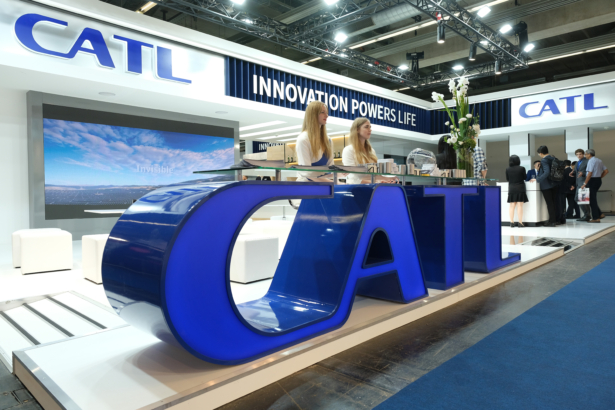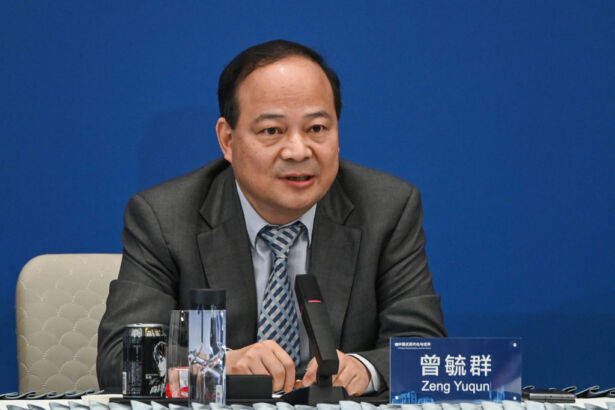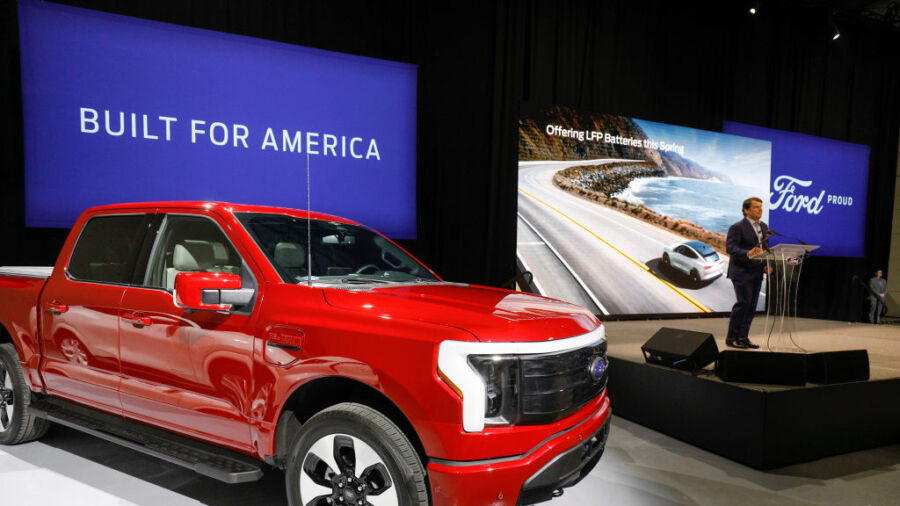U.S. lawmakers are seeking to review the license agreement between Ford Motor and a Chinese battery maker.
They are concerned that the deal will facilitate China’s global dominance in electric vehicle battery technology with American taxpayers’ money and increase America’s reliance on Chinese critical raw materials. According to the lawmakers, the Chinese battery maker’s supply chain in Xinjiang also raised a forced labor question, which is a potential violation of the Uyghur Forced Labor Prevention Act.
In February, Ford announced that a new $3.5 billion plant would be built in Marshall, Michigan, 100 miles west of Detroit, to produce lithium-iron-phosphate batteries, better known as LFP, a type of battery cheaper but less energy-dense than the nickel-cobalt-manganese chemistry that currently dominates the market.
A wholly owned subsidiary will own the factory and employ the workers, Ford said, while China’s Contemporary Amperex Technology Co. Ltd. (CATL), under a licensing agreement, will provide the EV battery technology, some equipment, and workers. CATL is the world’s largest manufacturer of EV batteries, known for its dominance in LFP batteries. Ford expects production to begin in 2026, with the plant estimated to produce enough batteries for 400,000 EVs each year.
“Rather than developing American technology, we are concerned that the deal could simply facilitate the partial onshoring of PRC-controlled battery technology, raw materials, and employees while collecting tax credits and flowing funds back to CATL through the licensing agreement,” wrote chairs of the House Select Committee on China and the House Ways and Means Committee in a Thursday letter addressed to Ford CEO James Farley.
“If Ford is using a licensing agreement to maximize benefits to itself or CATL at the expense of the U.S. taxpayer, this demonstrates a disregard for corporate responsibility as an American company,” the two chairmen warned in the letter. “Such behavior raises serious questions as Congress conducts oversight of the implementation of this and other federal tax incentives.”
Ford previously confirmed with The Epoch Times that it expected the deal to qualify for both consumer and advanced manufacturing credit under the Inflation Reduction Act. Experts estimated that the manufacturing credit could reach $1 billion and said that Ford couldn’t afford the $3.5 billion investment without the tax credit.
The letter comes after the House China panel’s bipartisan delegation visit to Detroit a month ago. The Ford–CATL deal was on the agenda of the committee members’ meeting with Mr. Farley. Afterward, Chair Mike Gallagher (R-Wis.) said the meeting was “the first conversation,” and he hoped to have many more.

Xi’s Advice to CATL
At the press conference, Mr. Gallagher shared similar concerns as stated in the July 20 letter to Ford. He said that “there’s no such thing as a private company in China,” referring to the Chinese Communist Party’s (CCP) overall control of the private sector.
Indeed, CATL seems to enjoy attention from the highest level in China.
The EV battery industry is one of the strategic sectors in Beijing’s national industrial plan, known as “Made in China 2025,” the CCP’s blueprint for global dominance in high-tech manufacturing.
At a side meeting in March during the “two sessions”—when China’s rubber-stamp legislature and China’s advisory body assemble—CATL chairman Zeng Yuqun reported to CCP leader Xi Jinping that CATL’s market share in the global EV battery market reached 37 percent and had been number one for six consecutive years, according to Chinese state-owned media reports.
CATL owes much of its rise to CCP subsidies and the regime’s policies closing off the Chinese EV battery market to foreign competition before June 2019.
In response to Mr. Zeng’s report, Mr. Xi said he was “happy and worried.” He advised Mr. Zeng to have “an exit strategy when others compete with us in a zero-sum game.”
“We need to avoid penetrating deep into enemy territory alone, only to be caught by others and get wiped out,” Mr. Xi warned about nascent industries.
Mr. Zeng is a member of the National Committee of the Chinese People’s Political Consultative Conference (CPPCC), a political advisory body to the communist regime. His current term expires in 2028.

Ford’s Response to Lawmakers
Ford declined to comment on the letter other than confirming that the company was reviewing it and would respond soon to the committee chairs, who gave a deadline of Aug. 10.
“On the subject more broadly, there has been a lot of misinformation about Ford’s new battery plant in Marshall, Michigan. Here are the facts: Ford alone is investing $3.5 billion and will own and run this plant in the United States instead of building a battery plant elsewhere or exclusively importing LFP batteries from China, like our competitors do,” wrote a Ford spokesperson to The Epoch Times in an email response.
“We’re creating 2,500 new American jobs while helping to strengthen domestic manufacturing and supply chains and reduce carbon emissions. This is good for our country, good for the planet, and good for Ford’s business,” she added.
Job creation was another item the lawmakers questioned in their letter. They questioned whether several hundred of the 2,500 jobs would be given to CATL employees from China and remain in the factory until approximately 2038.
According to The Detroit News, the estimated Michigan state incentive for jobs created by the EV battery plant ranges from $136,000 to $680,000 per job. However, those jobs pay an average of $45,000 per year, lower than the annual median household of about $53,000 in Calhoun County, where the battery plant is located.
However, lawmakers have previously expressed an understanding of the competitive dilemma in Ford’s view.
“I still think we’re trying to figure out what is the best path forward where American companies can onshore the production of critical technology, how we can solve some of the problems we have when it comes to critical minerals and rare earth processing, and without relying on Chinese companies,” Mr. Gallagher told reporters in Detroit. “And right now, I don’t have a silver bullet solution to that.”
Meanwhile, Ford is charging forward with its EV transformation. At the end of March, the company announced an investment in a $4.5 billion battery materials plant in Indonesia. China’s Zhejiang Huayou Cobalt Co. is reported to own 70 percent of the project (pdf) before Ford’s investment, according to Haitong Securities. Chinese media reported that Ford assumed a part of Huayou’s share and reduced Huayou’s ownership to 53 percent. The local Indonesian company’s ownership remained at 30 percent.
On its website in June, the Chinese company touted its investment in Indonesia as the “intersection of the ‘One Belt, One Road’ initiative and the company transformation.” “One Belt, One Road,” also known as the Belt and Road Initiative, is the CCP’s primary plan for global infrastructure dominance.
Last month, the Department of Energy’s Loan Program Office approved a $9.2 billion loan to Ford for its EV battery factories in Kentucky and Tennessee. These plants are constructed as a joint venture between Ford and SK On, a leading South Korean EV battery manufacturer using the nickel-cobalt-manganese technology, which currently dominates the LFP batteries China monopolizes.
From The Epoch Times

